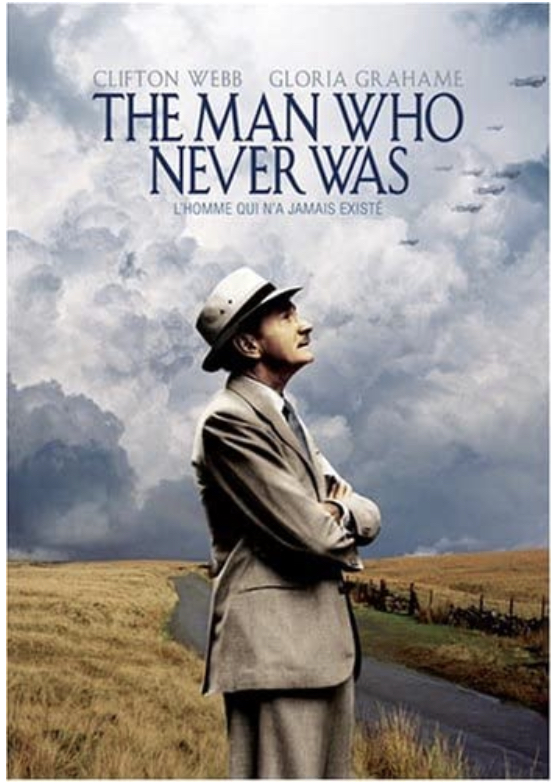
© 2022 G.N. Jacobs
A body with documents washes ashore with important documents. Major William Martin never exactly existed except in the minds of a special team of British intelligence officers tasked with creating confusion among the Nazis prior to the 1943 invasion of Sicily.
This first film version of the story about a gruesome and apparently highly successful deception operation is pretty much the first draft of the story. Seeing this movie the first time without benefit of reading either the eponymous book by Hon. LCDR Ewen Montague RN on which this film is based (see review) or the more complete Operation Mincemeat by Ben McIntyre (see review) gives the initial impression of a great movie. Now that I’ve read the real story, my current feeling has more to do with not even getting to the really good parts. The filmmakers including director Ronald Neame seemed more interested in the ‘just the facts, ma’am’ version of the story.’ We’ll see about the upcoming Operation Mincemeat based on McIntyre’s book (see review).
The story is streamlined to remove and consolidate many characters while presenting a mostly one-note depiction of fairly standard British stock characters. Clifton Webb as Montague does his best to seem like the real-life intelligence officer given the gruesome job. The thing is, even without the extra knowledge that comes from the decades-later declassification of the project’s full file, this movie doesn’t fully live up to what was known based on Montague’s book published in the 1950s. A publication that happened because a cabinet secretary wrote a novel about it and a journalist on the outside whom the British government wanted to cut off at the knees neared completing his own book.
Looking at the movie now, the interplay between the truthful parts, the mechanics of creating a person out of thin air with a real personality to convince Adolf Hitler to reinforce Sardinia and Greece at the expense of Sicily and the invented parts don’t mesh together the way I thought they did. The pure invention is Lucy (Gloria Grahame) who shares a flat in London with Pam (Josephine Griffin). The act of Pam farming out the letters to Lucy as she experiences the same emotions having her own whirlwind romance proves both dangerous and fortuitous.
Admiral Wilhelm Canaris sends an agent based in Dublin, Patrick O’Reilly (Stephen Boyd) to London to run down the basic facts of Major Martin’s life. This includes stops at the clothing store that sells British officers their uniforms, the residential club and finally Pam and Lucy’s flat. Tragically and luckily, Lucy’s actual fiancé died the same day that the German agent arrives to ask about the relationship with Major Martin. Her tears prove convincing and O’Reilly takes a risk exposing his address in London for final confirmation and is allowed to escape to prove his message.
This whole subplot is both a reason to see the movie and once you read the real story feel cheated at how extravagantly fictional it is. Gloria Grahame cries well on cue. She’s ecstatically happy when Joe is still alive and crushingly sad when he isn’t. And the music that plays underneath goes for schmaltz as sometimes happens in movies of the era. And Stephen Boyd as the Irish Nazi is appropriately terrifying is ways that not even his Mesala was a few years later…waiting in doorways like that approaching silently until the woman employed by British Intelligence but who still is a woman turns on the light.
The problem is that very little of this carried over into the streamlined but more factual scenes about Montague and his sidekick, George Akers (Robert Flemyng) a pseudonym for the real-life Charles Cholmondeley. At a key moment, Webb’s Montague basically runs a little roughshod over Pam when she gets a little weepy when she tries to explain how Lucy was so convincing when the German agent came calling. A little mean in any movie and downright weird as well as mean now that I’ve actually read the books on which this movie is based.
In a similar vein, the Akers character is a fairly ordinary dry witted English good-time guy stereotype that doesn’t hold up well having read the books. Even in Montagu’s book, where the still serving Cholmondeley needed to be written out of the story, the George on the page is more interesting than the George in this movie. And then when you read McIntyre’s book, you see how shallow and vacuous the fictional man really is. It gets funnier because Cholmondeley was on set acting as unofficial technical advisor during shooting.
When I first saw this movie on whatever cable channel it was, none of these issues mattered. I didn’t notice how the two halves didn’t really belong together in the same movie. It was a mostly true story about a true event in the war that worked out well for the Allies. I didn’t need better than that. Now I do. The movie still entertains, just try to see it before Operation Mincemeat.